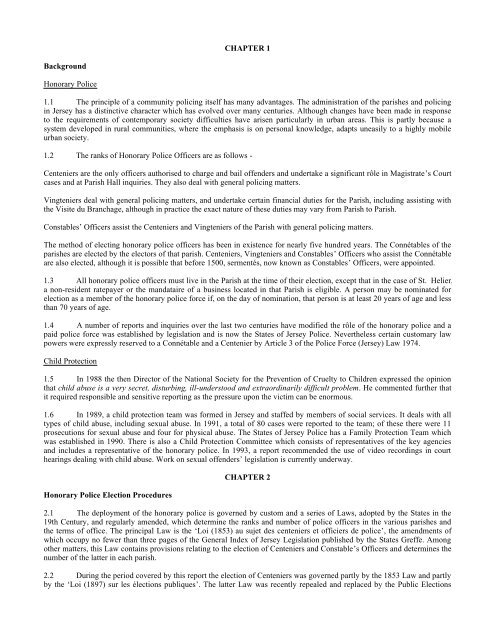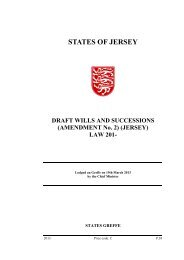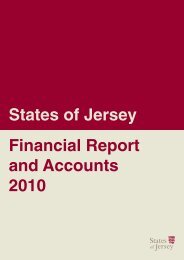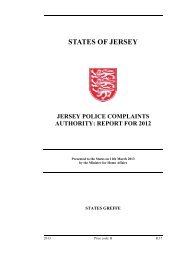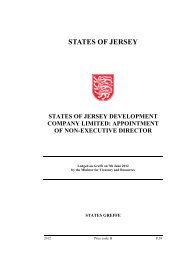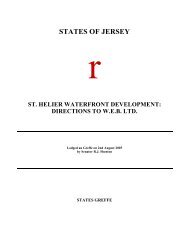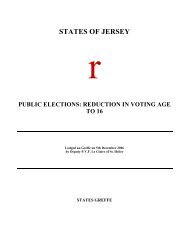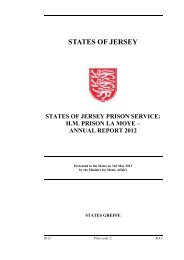report - States Assembly
report - States Assembly
report - States Assembly
- No tags were found...
You also want an ePaper? Increase the reach of your titles
YUMPU automatically turns print PDFs into web optimized ePapers that Google loves.
CHAPTER 1BackgroundHonorary Police1.1 The principle of a community policing itself has many advantages. The administration of the parishes and policingin Jersey has a distinctive character which has evolved over many centuries. Although changes have been made in responseto the requirements of contemporary society difficulties have arisen particularly in urban areas. This is partly because asystem developed in rural communities, where the emphasis is on personal knowledge, adapts uneasily to a highly mobileurban society.1.2 The ranks of Honorary Police Officers are as follows -Centeniers are the only officers authorised to charge and bail offenders and undertake a significant rôle in Magistrate’s Courtcases and at Parish Hall inquiries. They also deal with general policing matters.Vingteniers deal with general policing matters, and undertake certain financial duties for the Parish, including assisting withthe Visite du Branchage, although in practice the exact nature of these duties may vary from Parish to Parish.Constables’ Officers assist the Centeniers and Vingteniers of the Parish with general policing matters.The method of electing honorary police officers has been in existence for nearly five hundred years. The Connétables of theparishes are elected by the electors of that parish. Centeniers, Vingteniers and Constables’ Officers who assist the Connétableare also elected, although it is possible that before 1500, sermentés, now known as Constables’ Officers, were appointed.1.3 All honorary police officers must live in the Parish at the time of their election, except that in the case of St. Helier,a non-resident ratepayer or the mandataire of a business located in that Parish is eligible. A person may be nominated forelection as a member of the honorary police force if, on the day of nomination, that person is at least 20 years of age and lessthan 70 years of age.1.4 A number of <strong>report</strong>s and inquiries over the last two centuries have modified the rôle of the honorary police and apaid police force was established by legislation and is now the <strong>States</strong> of Jersey Police. Nevertheless certain customary lawpowers were expressly reserved to a Connétable and a Centenier by Article 3 of the Police Force (Jersey) Law 1974.Child Protection1.5 In 1988 the then Director of the National Society for the Prevention of Cruelty to Children expressed the opinionthat child abuse is a very secret, disturbing, ill-understood and extraordinarily difficult problem. He commented further thatit required responsible and sensitive <strong>report</strong>ing as the pressure upon the victim can be enormous.1.6 In 1989, a child protection team was formed in Jersey and staffed by members of social services. It deals with alltypes of child abuse, including sexual abuse. In 1991, a total of 80 cases were <strong>report</strong>ed to the team; of these there were 11prosecutions for sexual abuse and four for physical abuse. The <strong>States</strong> of Jersey Police has a Family Protection Team whichwas established in 1990. There is also a Child Protection Committee which consists of representatives of the key agenciesand includes a representative of the honorary police. In 1993, a <strong>report</strong> recommended the use of video recordings in courthearings dealing with child abuse. Work on sexual offenders’ legislation is currently underway.Honorary Police Election ProceduresCHAPTER 22.1 The deployment of the honorary police is governed by custom and a series of Laws, adopted by the <strong>States</strong> in the19th Century, and regularly amended, which determine the ranks and number of police officers in the various parishes andthe terms of office. The principal Law is the ‘Loi (1853) au sujet des centeniers et officiers de police’, the amendments ofwhich occupy no fewer than three pages of the General Index of Jersey Legislation published by the <strong>States</strong> Greffe. Amongother matters, this Law contains provisions relating to the election of Centeniers and Constable’s Officers and determines thenumber of the latter in each parish.2.2 During the period covered by this <strong>report</strong> the election of Centeniers was governed partly by the 1853 Law and partlyby the ‘Loi (1897) sur les élections publiques ’. The latter Law was recently repealed and replaced by the Public Elections


